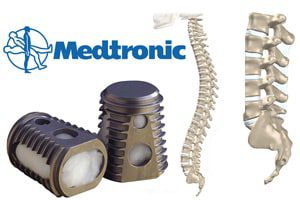
An Illinois state court judge just denied device maker, Medtronic Inc.’s, bid to dismiss a lawsuit brought over its InFuse bone graft product. The lawsuit included allegations that InFuse caused a patient to undergo additional surgery that led to permanent disability, The judge, Cook County Circuit Court Judge Eileen Mary Brewer, issued a hand-written order […]
 An Illinois state court judge just denied device maker, Medtronic Inc.’s, bid to dismiss a lawsuit brought over its InFuse bone graft product. The lawsuit included allegations that InFuse caused a patient to undergo additional surgery that led to permanent disability,
An Illinois state court judge just denied device maker, Medtronic Inc.’s, bid to dismiss a lawsuit brought over its InFuse bone graft product. The lawsuit included allegations that InFuse caused a patient to undergo additional surgery that led to permanent disability,
The judge, Cook County Circuit Court Judge Eileen Mary Brewer, issued a hand-written order that denied Medtronic’s motion of dismissal due to pre-emption. The claims brought include negligence, strict liability, breach of warranty, and willful and wanton conduct, according to Law360. The lawsuit also names Northwestern Memorial Hospital, Northwestern Orthopaedic Institute LLC, and Dr. Mark T. Nolden, citing negligence.
According to the lawsuit, the physician allegedly diagnosed the plaintiff with problems in his cervical spine, including cervical spondylosis (age-related wear in the neck’s spinal discs), according to the Mayo Clinic; in 2011, the physician performed a posterior cervical fusion in which the problematic disc was removed and replaced with bone growth material. Medtronic’s InFuse product was used off-label in the surgery, according to the lawsuit which also asserts that the U.S. Food and Drug Administration (FDA) has not approved InFuse for cervical spine procedures and that Medtronic’s sales representatives and so-called “opinion leaders” touted, trained, and urged the physician to use InFuse off-label.
Following the surgery, the lawsuit alleges, the plaintiff developed a life-threatening complication requiring emergency surgery; the man was left partially paralyzed with a permanent disability and pain that impacts him daily, according to Law360.
InFuse is a bone graft product marketed by Medtronic is synthetic, or genetically engineered, recombinant human Bone Morphogenetic Protein (rhBMP-2). The FDA approved InFuse in 2002 for specific uses.
InFuse was designed to stimulate spine growth in patients suffering from lower spinal degenerative disease and was approved for use in one type of spinal surgery and some dental procedures. InFuse is not approved for use on the upper, or cervical spine; however, the bone graft product is widely used in off label procedures. On July 1, 2008 the agency issued a notification warning about InFuse’s association with serious complications when used in cervical spinal fusions.
It is illegal for Medtronic, or any device or drug maker, to market a product for uses that the FDA has not approved. Physicians are free to prescribe device and drugs for off label purposes as they see fit.
Infuse has been associated with a number of adverse reactions, such as:
Medtronic’s marketing of InFuse has been the focus of growing controversy and there are concerns over how InFuse research was conducted, including that it was Medtronic-funded. Medtronic has been accused of promoting Infuse off label, of downplaying the device’s risks, and of overstating InFuse benefits. This led to a Senate probe, and FDA warning, and independent studies.
Most patients and physicians are not aware of the notorious history connected to Medtronic’s InFuse and that traditional bone grafting, which utilizes bone harvested from the patient, is a safer option.
InFuse remains on the market and continues to be used in surgical procedures.


